Bryan D. Jones, The Southern Fault Line: How Race, Class, and Region Shaped One Family's History" (Oxford UP, 2025)
The Southern Fault Line: How Race, Class, and Region Shaped One Family's History (Oxford University Press, 2025) explores the under-appreciated division in the South between the oligarchic rule of plantation owners and industrialists on the one hand, and the more democratic mindset of the mountain-dwelling small farmers on the other. These two mindsets were in continual tension from the 1800s to the 1960s, when the adherents of the more democratic side of the struggle capitulated to the oligarchical side in response to the Civil Rights movement.
Bryan Jones draws from his own family's centuries-old history in the region to explore the rise and fall of the "two minds" of the South. Through a comparison of the experiences of a slaveholding line in his family with three non-slaveholding lines, Jones provides a rich history of the politics of both class and race in the region from the Founding era to the present. The slaveholding side of his family settled in Black Belt Alabama, while ancestral members of the other side of his family were poorer uplanders. In the 1890s, the latter supported the burgeoning populist movement, which for a short window of time tried to unite poor Blacks and poor whites against the patrician planter class and industrialists. After a series of close elections, the planter class was able to stanch the populist tide. They did this in large part by sowing racial division among populism's supporters. Indeed, one of Jones' ancestors helped draft the 1901 Alabama constitution that made Jim Crow the law of the state.
Throughout, Jones shows how deep the political differences were between the two regions, with oligarchy characterizing the slaveholding region and a more democratic ethos shaping the non-slaveholding areas. Jones serves as the final observer, a white boy observing not only the demise of the Jim Crow South, but--in the wake of the Civil Rights movement--the demise of the mountain democratic South as well. Today, the vast majority of Southern whites regardless of class support an oligarchical Republican Party.
Bryan Jones is J.J."Jake" Pickle Regents' Chair in Congressional Studies at the University of Texas at Austin.
Caleb Zakarin is editor of the New Books Network.
Learn more about your ad choices. Visit megaphone.fm/adchoices
Support our show by becoming a premium member! https://newbooksnetwork.supportingcast.fm/political-science
